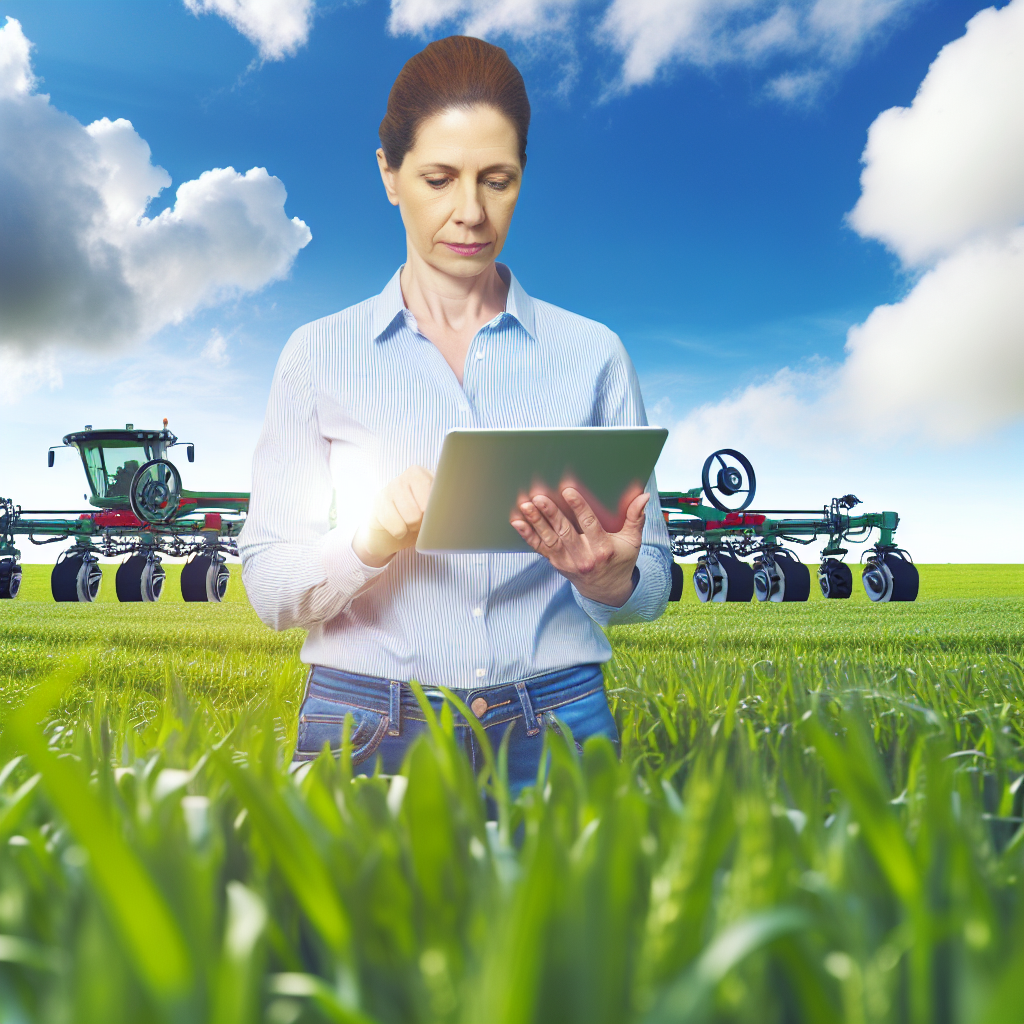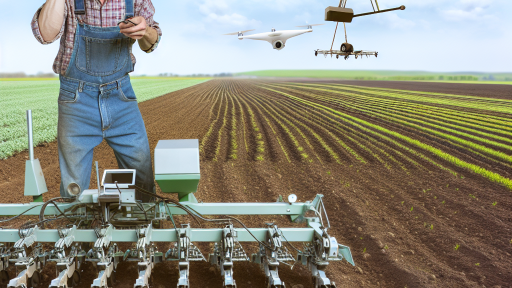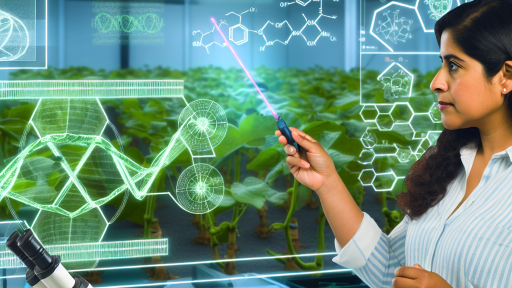Introduction to AI Technologies in Agriculture
Overview of AI in Agriculture
Artificial intelligence significantly impacts modern agriculture.
Farmers utilize AI technologies for improving productivity.
These technologies enhance decision-making and resource management.
Types of AI Technologies
AI encompasses various technologies tailored for agriculture.
Machine learning algorithms analyze data for predictive insights.
Robotics automate labor-intensive tasks on farms.
Drones provide aerial imagery for crop monitoring.
Benefits of AI in Agriculture
AI improves yield by optimizing planting schedules.
It conducts real-time monitoring of crops and livestock.
Additionally, it reduces waste and minimizes environmental impact.
Case Studies
Several farms successfully implement AI technologies.
For example, GreenFields Farms employs predictive analytics.
They increase crop yield efficiently and sustainably.
Another case involves Sunny Valley using drones for precise irrigation.
Challenges and Considerations
Despite its benefits, AI adoption faces challenges.
Transform Your Agribusiness
Unlock your farm's potential with expert advice tailored to your needs. Get actionable steps that drive real results.
Get StartedHigh initial costs can deter small farmers.
Additionally, data privacy remains a significant concern.
Education and training are crucial for effective use of these technologies.
Overview of Key AI Technologies in Farming
Precision Agriculture
Precision agriculture utilizes AI to enhance crop yields.
This technology analyzes various data points to make informed decisions.
Farmers use sensors and drones to gather vital information.
Consequently, they can optimize planting, watering, and harvesting schedules.
As a result, efficiency improves while reducing waste.
AI-Driven Crop Monitoring
AI-driven crop monitoring assesses plant health throughout the seasons.
Machine learning algorithms process data from photos and sensors.
These tools identify pests, diseases, or nutrient deficiencies quickly.
Furthermore, they deliver actionable insights to farmers directly.
This approach sustains crop productivity and quality.
Automated Irrigation Systems
Automated irrigation systems integrate AI for efficient water management.
These systems analyze weather forecasts and soil moisture levels.
Farmers can minimize water usage while ensuring adequate supply.
Consequently, they conserve water and reduce costs.
This technology promotes sustainable farming practices.
Predictive Analytics
Predictive analytics harnesses historical data to forecast trends.
Farmers can use this information to anticipate market demands.
Additionally, they can make strategic decisions on crop selection.
As a result, they enhance their profitability and reduce risks.
AI-powered analytics create a proactive farming environment.
Robotics and Automation
Robotics and automation enhance labor efficiency in agriculture.
Showcase Your Farming Business
Publish your professional farming services profile on our blog for a one-time fee of $200 and reach a dedicated audience of farmers and agribusiness owners.
Publish Your ProfileAutomated machines perform tasks like planting, weeding, and harvesting.
AI technologies enable these machines to adapt to changing conditions.
Consequently, farms can operate with lower labor costs.
This trend optimizes productivity in growing operations.
How AI is Enhancing Crop Management and Precision Agriculture
Introduction to AI in Agriculture
AI technologies reshape the agricultural landscape rapidly.
Agricultural practices benefit significantly from data analysis.
Farmers use AI to predict crop yields and optimize growth conditions.
Improved Crop Management
AI enhances crop management through advanced data analytics.
Farmers can monitor soil health in real-time.
Machine learning algorithms provide insights into crop diseases.
For instance, AgriTech Solutions recently launched a crop monitoring app.
This app leverages satellite imagery to assess plant health.
Predictive Analytics
Predictive analytics help farmers anticipate issues before they arise.
AI analyzes historical weather patterns and growth data.
This analysis allows farmers to make informed decisions.
Precision Irrigation
AI streamlines irrigation processes for optimal water usage.
Smart irrigation systems adjust water levels based on real-time data.
This method conserves water and promotes healthy crop growth.
Precision Agriculture Techniques
Precision agriculture utilizes AI to enhance farming efficiency.
By implementing drones, farmers can survey large fields quickly.
Drones collect valuable data, reducing the need for manual labor.
Soil Monitoring
Soil sensors provide continuous feedback on soil conditions.
Farmers can adjust nutrient levels based on sensor data.
This approach ensures crops receive the necessary nutrients.
Yield Optimization
AI analyzes yield data to help farmers maximize production.
Machine learning models identify the best cultivation practices.
This results in higher yields and greater profitability.
Challenges and Considerations
Despite its benefits, AI adoption presents challenges.
High initial costs can deter some farmers from implementation.
Training is essential to help farmers effectively utilize AI tools.
Data Privacy
Concerns about data privacy also affect AI integration.
Farmers must understand how their data will be used and protected.
Future Developments
The future of agriculture looks promising with AI advancements.
Innovations will continue to emerge, enhancing efficiency further.
AgriTech companies are investing heavily in research and development.
Gain More Insights: Maximizing Farm Profitability With Innovative Agri-Fintech Solutions
The Role of Machine Learning in Predicting Crop Yields and Weather Patterns
Machine Learning Overview
Machine learning significantly advances agricultural practices today.
It leverages vast amounts of data to improve farming techniques.
This technology applies algorithms to analyze trends and make predictions.
Predicting Crop Yields
Predicting crop yields is essential for ensuring food security.
Showcase Your Farming Business
Publish your professional farming services profile on our blog for a one-time fee of $200 and reach a dedicated audience of farmers and agribusiness owners.
Publish Your ProfileMachine learning models utilize historical yield data for accurate predictions.
Farmers can input variables like soil quality and rainfall patterns.
For instance, AgriTech Innovators developed an AI tool.
This tool helps farmers estimate yields before harvest season.
Key Benefits of Yield Predictions
- Farmers can optimize planting schedules.
- Resource allocation becomes more efficient.
- Minimized financial risks lead to better investment decisions.
Weather Pattern Forecasting
Weather patterns significantly influence agricultural productivity.
Machine learning aids in analyzing weather data over time.
It observes patterns that humans might overlook.
The WeatherWise Company uses AI for precise weather forecasts.
As a result, farmers receive timely alerts about changes.
Impacts of Accurate Weather Predictions
- Farmers can mitigate the impact of adverse weather.
- Crop management strategies can adapt accordingly.
- Improved predictions foster sustainable farming practices.
Integration of Technologies
The integration of machine learning and IoT is crucial.
IoT devices collect real-time data from farm fields.
This data enhances the accuracy of machine learning models.
Farmers can make informed decisions based on real-time information.
Future Prospects
The future of agriculture looks promising with machine learning.
Innovations continue to evolve, providing better tools for farmers.
Moreover, global food security becomes increasingly attainable.
Delve into the Subject: The Future Of Crop Disease Detection Technologies In Agricultural Practices
Autonomous Equipment: Drones and Robots in Modern Farming
The Rise of Drones in Agriculture
Drones have revolutionized agricultural monitoring and management.
Farmers utilize drones to gather real-time data on crop health.
They provide insights into soil conditions and irrigation needs.
Additionally, drones help identify pest infestations early.
This timely information allows farmers to make informed decisions.
Consequently, drone usage contributes to increased yields.
Robotic Innovations Transforming Farming Practices
Robots are becoming essential tools in modern agriculture.
These machines perform repetitive tasks with precision and speed.
For instance, robotic harvesters efficiently gather crops.
Moreover, they reduce labor costs and minimize human errors.
These machines also ensure a consistent quality of produce.
Benefits of Autonomous Equipment
Integrating autonomous equipment brings numerous advantages.
First, it enhances operational efficiency on farms.
Second, it allows farmers to optimize resource use.
For example, precision agriculture techniques improve yield.
This technology also promotes sustainable practices in farming.
Ultimately, it leads to increased profitability for farmers.
The Future of Autonomous Farming
The future of agriculture lies in advanced technologies.
As technology evolves, we can expect more automation.
This shift may lead to smarter, more resilient farming systems.
In addition, collaboration between humans and machines will grow.
Farmers will likely rely on data-driven practices to guide decisions.
Thus, the agricultural landscape will continue to transform.
Showcase Your Farming Business
Publish your professional farming services profile on our blog for a one-time fee of $200 and reach a dedicated audience of farmers and agribusiness owners.
Publish Your ProfileUncover the Details: Environmental Impact Of Genetically Modified Agriculture

AI-Driven Pest and Disease Detection Systems
Introduction to AI in Agriculture
Artificial intelligence transforms agriculture by enhancing pest and disease detection.
Farmers increasingly utilize AI to protect crops and maximize yields.
These technologies assist in identifying threats early and accurately.
How AI Algorithms Work
AI algorithms analyze data from various sources.
They use images, environmental data, and historical information to detect pests and diseases.
Machine learning models improve detection accuracy over time.
Benefits of AI-Driven Detection
AI systems offer rapid analysis of agricultural conditions.
They provide real-time monitoring of crops and environments.
Additionally, they reduce the need for chemical pesticides by identifying problems early.
This approach leads to healthier ecosystems and more sustainable practices.
Case Studies Highlighting Success
Several farms have successfully implemented AI-driven solutions.
For instance, GreenTech Farms improved their yield by 20% in one season.
They used AI tools to monitor plant health and adjust treatment accordingly.
This proactive approach minimized losses and optimized resource use.
Future of AI in Agriculture
The future looks promising for AI in agriculture.
Ongoing advancements will refine detection technologies even further.
Additionally, greater accessibility will empower more farmers to adopt these solutions.
Incorporating AI will be pivotal in food security and sustainable farming.
Explore Further: Streamlining Farm Operations With Automated Machinery
Case Studies of Successful AI Implementation in Agricultural Operations
Enhancing Crop Management with Drones
AgriTech Solutions deployed drones to monitor crop health.
This technology provides real-time data to farmers.
Consequently, farmers can make informed decisions quickly.
As a result, crop yields improved by an average of 20%.
Precision Farming with Predictive Analytics
HarvestIQ employed predictive analytics to optimize planting schedules.
This approach analyzes weather patterns and soil conditions.
Farmers adjusted their planting based on accurate forecasts.
Ultimately, they reduced resource waste and increased efficiency.
AI-Driven Pest Management Solutions
GreenGuard Technologies introduced AI to identify pest threats.
The system uses images captured by field cameras.
Farmers received alerts about potential infestations promptly.
This proactive approach minimized pesticide use significantly.
Automated Irrigation Systems
IrrigoTech integrated AI into irrigation systems for better water management.
The technology assesses soil moisture levels in real-time.
It adjusts irrigation schedules based on crop needs automatically.
This innovation reduced water usage by up to 30%.
Robotics in Harvesting
AgriRobot Inc. developed robotic systems for fruit harvesting.
These robots recognize ripe fruits and harvest them efficiently.
Farmers experienced reduced labor costs as a result.
They also minimized crop damage during the harvesting process.
Showcase Your Farming Business
Publish your professional farming services profile on our blog for a one-time fee of $200 and reach a dedicated audience of farmers and agribusiness owners.
Publish Your ProfileImproving Supply Chain Efficiency
FarmChain utilized AI to streamline agricultural supply chains.
The platform predicts demand and optimizes distribution routes.
Farmers enjoyed reduced transportation costs and spoilage rates.
Consequently, profits increased for multiple agricultural stakeholders.
Future Trends: The Evolving Landscape of AI in Farming
Integration of AI Technologies
Farmers increasingly integrate AI technologies into their operations.
This trend enhances productivity and efficiency significantly.
Moreover, machine learning algorithms analyze vast amounts of agricultural data.
As a result, farmers make informed decisions quickly and effectively.
Precision Agriculture Innovations
Precision agriculture continues to gain traction among farming professionals.
This approach utilizes AI for crop monitoring and soil assessments.
Consequently, it allows for targeted interventions and resource allocation.
Farmers can reduce waste and improve overall yield quality.
Robotics and Automation in Farming
Robots and automation change the face of modern agriculture.
Automated systems handle tasks such as planting, harvesting, and packaging.
These innovations reduce labor costs while increasing operational efficiency.
Furthermore, they allow farmers to focus on strategic decision-making.
Data-Driven Farming Practices
AI-driven data analysis revolutionizes traditional farming practices.
Farmers use real-time data to monitor crop health and growth patterns.
Therefore, they can implement timely interventions to mitigate risks.
This practice enhances productivity and sustainability in agriculture.
Challenges and Opportunities
Despite the benefits, challenges remain in adopting AI technologies.
Some farmers face limited access to capital and technological resources.
Additionally, there is a need for training and support in AI application.
However, these challenges present opportunities for innovation and growth.
The Role of Collaboration
Collaboration among tech companies and farmers drives AI adoption.
Partnerships foster the development of new tools and platforms.
These collaborations create tailored solutions for diverse agricultural needs.
Ultimately, they ensure a more sustainable agricultural future.
Additional Resources
US farms are making an urgent push into AI. It could help feed the …
Precision Agriculture: Benefits and Challenges for Technology …




